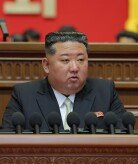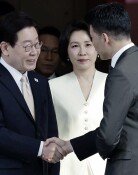[Opinion] Is it a Parliamentary Audit of State Administration or a Picnic?
[Opinion] Is it a Parliamentary Audit of State Administration or a Picnic?
Posted October. 21, 2006 07:17,
Nine lawmakers on Agriculture, Forestry, Maritime Affairs & Fisheries Committee of the National Assembly probably felt like they were on a picnic on October 19. They flew from Jeonju to Saemangeum embankment on three fire helicopters of the Forest Government Information Agency. The three fire helicopters were mobilized from Iksan and Wonju. Saemangeum embankment is just one hour away from Jeonju by car. However, since the lawmakers were carrying out such an important mission of parliamentary audit, helicopters were mobilized from a far distance. The nine lawmakers listened to one officials explanation about the embankment for 20 minutes and then enjoyed the delicacy of sushi and wild berry wine, which were prepared by the Korea Agricultural and Rural Infrastructure Corporation. In the evening, they returned to Jeonju by helicopter and again enjoyed dinner. Operating three fire helicopters for the day cost about 30 million won worth of taxes.
Every Friday during the parliamentary audit session, lawmakers wearing their golden badges, the symbol of their identity, are everywhere on Jeju Island. Yesterday, the third Friday of October, about 40 lawmakers of ruling or opposition parties on Education Committee, the Environment & Labor Committee, or Agriculture, Forestry, Maritime Affairs & Fisheries Committee visited Jeju Island for a field audit. On October 27, lawmakers from Government Administration and Home Affairs Committee are scheduled to visit the island for inspection and investigation of the Jeju Province and its economy. After one day of inspection, what awaits them is a long weekend on the exotic island.
What parliamentary audit of state administration means is that the National Assembly monitors the implementation of policies by the administration. During Koreas renovation era in the 1970s, the National Assemblys right for audit was scrapped for fear of being an obstacle to state administration. Koreas constitution under the 5th Republic acknowledged only investigative power of Parliament but then National Assemblys right for parliamentary audit was fully restored in the 6th Republic constitution in 1988.
There is even a saying: A parliamentary audit is a way to feel the power of lawmakers in earnest. It is indeed utilized as a way to prove the powerful rights of lawmakers. It is not unusual for lawmakers, who receive entertainment from monitored institutions in return for nominal inspection, to cause trouble.
In the U.S., senators and congressmen go about their work in Washington from Monday to Friday, and in their own districts on the weekends. The schedule of lawmakers in Washington is made on a 10 to 15 minute-basis, and they are busier than students preparing for exams. Most U.S. representatives are literally professional politicians. But in not just a few cases, our lawmakers conduct parliamentary audits as if they are on a picnic. No wonder people consider them bums that are entitled to special rights.
Gwon Sun-taek, Editorial writer, maypole@donga.com







